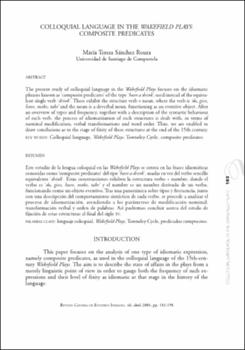Colloquial Language in The Wakefield Plays: Composite Predicates
Fecha
2003Resumen
Este estudio de la lengua coloquial en las Wakefield Plays se centra en las frases idiomáticas
conocidas como ‘composite predicates’ del tipo ‘have a drink’, usadas en vez del verbo sencillo
equivalente ‘drink’. Estas construcciones exhiben la estructura verbo + nombre, donde el
verbo es ‘do, give, have, make, take’ y el nombre es un nombre derivado de un verbo,
funcionando como un objeto eventivo. Tras una panorámica sobre tipos y frecuencia, junto
con una descripción del comportamiento sintáctico de cada verbo, se procede a analizar el
proceso de idiomatización, atendiendo a los parámetros de modificación nominal,
transformación verbal y orden de palabras. Así podremos concluir acerca del estado de
fijación de estas estructuras al final del siglo XV. The present study of colloquial language in the Wakefield Plays focuses on the idiomatic
phrases known as ‘composite predicates’ of the type ‘have a drink’, used instead of the equivalent
single verb ‘drink’. These exhibit the structure verb + noun, where the verb is ‘do, give,
have, make, take’ and the noun is a deverbal noun, functioning as an eventive object. After
an overview of types and frequency, together with a description of the syntactic behaviour
of each verb, the process of idiomatization of such structures is dealt with, in terms of
nominal modification, verbal transformations and word order. Thus, we are enabled to
draw conclusions as to the stage of fixity of these structures at the end of the 15th century.





